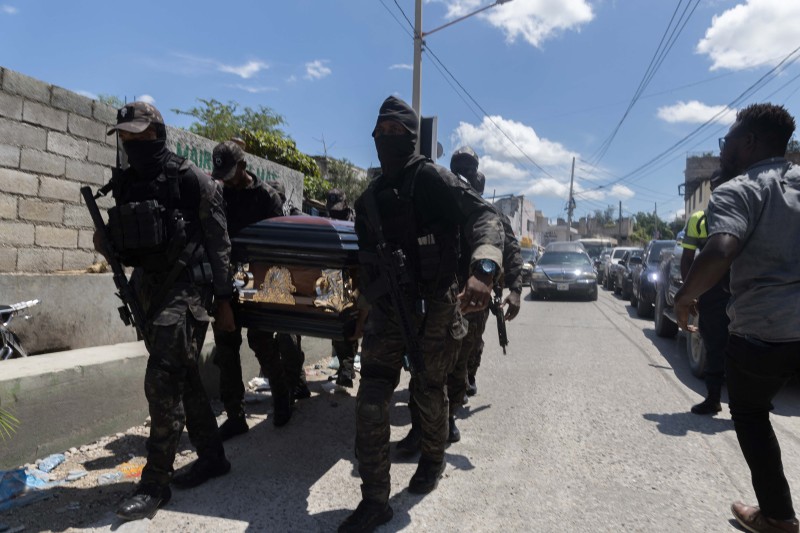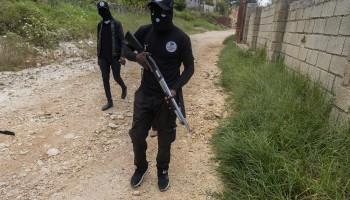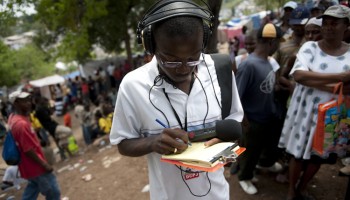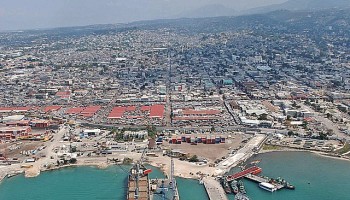Reported by
A new United Nations force has begun operating in Haiti amid a flurry of media messaging about its mandate to “neutralize” heavily-armed criminal gangs, which have seized control of much of the Caribbean nation in a murderous rampage.
But amid the hype, analysts are asking whether the Gang Suppression Force (GSF) will be any more effective than the previous UN mission that just wrapped up.
“So far, what we have is a name change,” Nathalye Cotrino of Human Rights Watch told OCCRP.
The previous UN force, the Kenyan-led Multinational Security Support Mission, was sent to Haiti two years ago to bolster the national police. But the gangs only grew in strength, overpowering security forces as the death toll rose.
More than 5,600 people were killed in 2024 while armed groups now control as much as 90 percent of Haiti’s capital, Port au Prince, according to the UN. Gangs began expanding into the countryside this year, displacing more than 1.3 million people. At least 3,100 people were murdered in the first half of 2025.
The criminal groups are “terrorizing civilians with kidnappings for ransom, rapes, and killings,” the UN said.
The previous UN mission was underfunded, and never reached its target of 2,500 international soldiers. The new GSF aims for 5,550 soldiers that will work with an initial 12-month mandate to “neutralize gangs, secure infrastructure, and support humanitarian access,” according to the UN.
However, the Center for Strategic and International Studies, an American research organization, pointed out in an article that the GSF faces some of the same challenges as its Kenya-led predecessor, known as the MSS.
“On paper, the GSF represents a major escalation of international efforts to combat the gangs,” wrote the authors, Georges A. Fauriol and Mary Speck.
"In reality, the new mission still needs to overcome the funding and personnel shortfalls that plagued the MSS,” they added.
The UN itself has alluded to the difficulties in creating the robust force that the Security Council has mandated.
“It will take time to build up the new force to the target of 5,500 security personnel plus 50 civilian staff and to establish the UN office to support it,” the international body said.
“It is still not clear which countries will provide personnel. The Security Council resolution states that the force will be funded primarily through voluntary contributions from UN Member States.”
So far, the gangs do not appear intimidated by the new UN mission, according to Antonal Mortimé, co-director of Defenseurs Plus, a Port-au-Prince-based human rights organization.
“Despite the announcement of its arrival, the armed groups are becoming more cruel and threatening,” he told OCCRP. “They continue to invade new zones and communes.”
The newly-minted GSF announced last week that it had carried out its first patrols alongside Haitian police and military. In one “major operation,” the joint force took control of a road from the Gran-Griff gang in order to secure supply routes to police stations.
“Gang members attempted to reinforce their defenses by digging trenches and occupying tall buildings along both sides of the road, from which they launched Molotov cocktails,” the GSF said in a public statement.
The GSF’s first update on its activities followed several announcements from the UN and governments including the U.S. and Barbados, as well as the Caribbean Economic Community. Canada announced it was providing CAN$60 million to fund the force, and last week sent its UN ambassador to Haiti.
Cotrino of Human Rights Watch welcomed the international attention to Haiti’s gang crisis, but she and Mortimé both warned that the GSF would need rigorous monitoring to ensure soldiers do not exploit civilians — an issue that has affected past missions.
Cotrino also called for a much broader approach to the crisis, including programs to reintegrate former gang members into society — especially minors, who are often forcibly recruited.
“We are not calling for an on-the-ground intervention force, but for a comprehensive international response,” said Cotrino. “We respect and support the progress that has been made in this international response. We consider it insufficient, but it is a good step.”






